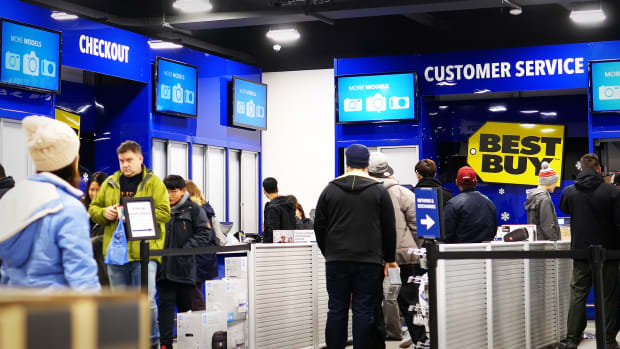The covid pandemic caused some very bizarre purchasing patterns that have made it very hard for retailers to forecast upcoming demand. Some items -- like toilet paper, paper towels hand sanitizer, and other items you use up -- saw a spike in sales during the lockdown period with demand being at an elevated level even now because, well, many of us spend more time at home.
It's hard for retailers to know exactly how much of those things we need, but being a little wrong doesn't really matter because all of those items have a long shelf life. Target (TGT) and Walmart (WMT) have made it clear that they bought too many large items including television sets because demand had been accelerated during the pandemic.
Both retailers misjudged how long that demand would last and have had to sell off excess inventory at lower prices (and depressed margins) to clear out space for holiday merchandise. Those sales will likely push out demand for televisions even further as most people who needed one likely already bought one.
People only replace their electronics every so often. They may accelerate that schedule when something new comes out, or when they're stuck at home for months watching cornhole reruns, Korean baseball, and basketball players playing HORSE (yes, ESPN showed all of those things during the darkest days of covid). But, if you just upgraded your TVs, your computer, and maybe even your appliances, you're not likely to do it again for a while.
That's short-term bad news for Best Buy (BBY), but it does not change the long-term prospects for the company.

Image source: Shutterstock
Best Buy Remains a Strong Business
It wasn't all that long ago when Best Buy looked like it was going to be a casualty of Amazon (AMZN), Customers would visit the retailer, put their hands on various items it sold, then buy the item for a better price on Amazon. That practice, "showrooming" seemed like it would lead to the end of the brick-and-mortar retailer until Hubert Joly took over as CEO in 2012.
Joly came in and made a lot of changes. The most notable one was making his company roughly price competitive with Amazon. Best Buy did not have to be cheaper than its rival, or even the same price, it simply had to be close enough that people would want to make the purchase now.
That's oversimplifying Best Buy's turnaround, but it's fair to say that Joly proved that many people want to see big-ticket items before they buy them. The chain recovered and after a rough early start to the pandemic when its stores were closed, it became a real covid winner.
But, if Target and Walmart have suffered from demand being pulled ahead for a few items they sell, Best Buy has a whole store full of that problem. Many of us bought new TVs, upgraded our laptops, put in fancy WiFi routers, and bought new appliances.
That means we won't need to replace those items for a while which is short-term bad news for Best Buy, but not an actual long-term problem.
Best Buy Has Had a Strong Two Years
While CEOs always spin their company's negative results in a positive light, Best Buy CEO Corie Barry makes a compelling argument due to the (hopefully) once-in-a-lifetime events of 2021.
"Our comparable sales were down 12.1% as we lapped strong Q2 comparable sales last year of almost 20%," Barry said during her chain's second-quarter earnings call."This represents 8.3% sales growth over the second quarter of pre-pandemic fiscal '20."
Basically, Best Buy sold an awful lot of stuff last year that pulled ahead demand for this year. That's exactly what happened at Walmart and Target, just on a smaller scale.
Barry said that Best Buy expected this to happen.
"We assumed the CE [consumer electronics] industry would be lower following two years of elevated growth, driven by unusually strong demand for technology, products, and services; and fueled partly by stimulus dollars. In addition, we expected to see some impact to our business as customers broadly shifted their wallet spend back into experience areas, such as travel and entertainment," she said.
That was compounded by problems the CEO did not foresee.
"We did not expect and compounding these impacts is a changing macro environment where consumers are dealing with sustained and record-high levels of inflation in some of the most fundamental parts of their daily lives, like food," she added.
Yes, Best Buy had a bad quarter and may have a bad year, but the chain's prospects for the future remain strong. That makes its stock, down 36% over the past year, should recover as consumer demand rebuilds. That will take time, but it's what's likely to happen.







